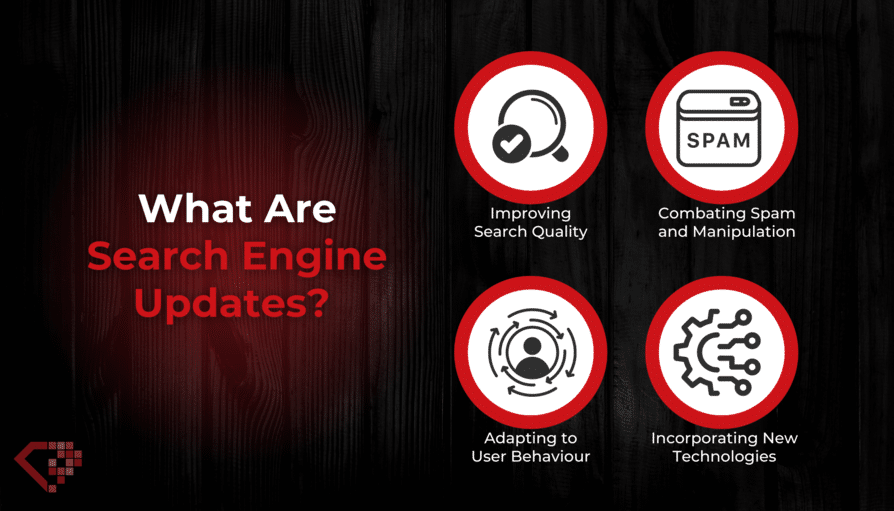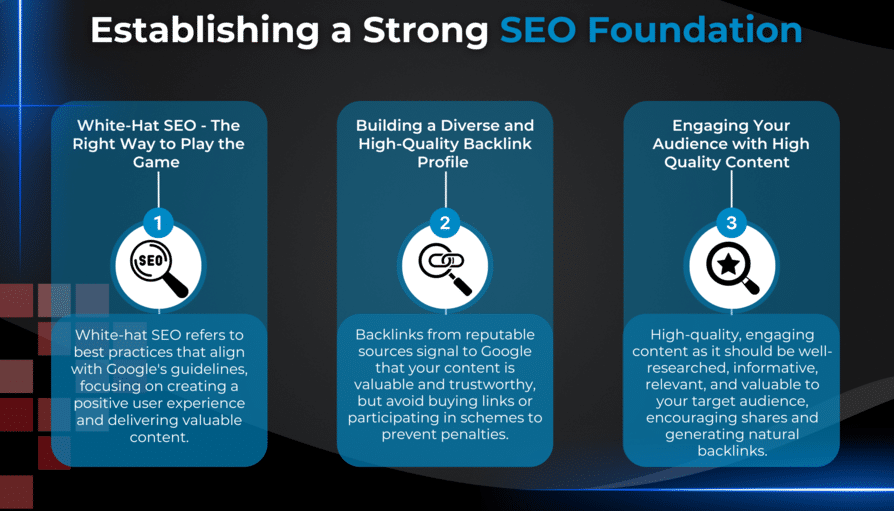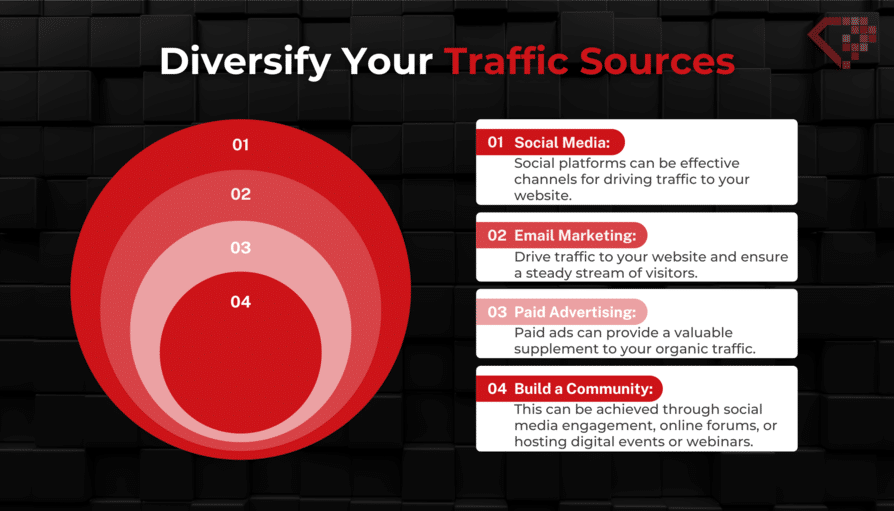Google search engine updates have a reputation for shaking up the online landscape. Websites that were once riding high in the search rankings can suddenly find themselves plummeting after an algorithm change. These updates can be unsettling but understanding them and taking proactive steps can significantly lessen their impact on your website’s search engine optimisation (SEO).
In this blog post, we will equip you with actionable Google SEO algorithm tips, explore the importance of a solid SEO foundation, discuss how to monitor your website’s performance, and outline strategies for diversifying your traffic sources.
By following these SEO best practices, you can protect your website’s visibility and ensure a steady flow of organic traffic, regardless of algorithm changes. If you are not familiar with Google’s major search engine updates, we recommend reading our previous blog post, Understanding the Impact of Search Engine Updates on your Website’s SEO.
What Are Search Engine Updates?
Staying informed about Google’s search engine updates is the first step to minimising their impact. Google typically announces major updates through its official channels, such as the Google Search Central Blog.
Reputable SEO news sites such as Search Engine Journal, Search Engine Land, and of course, our very own Ruby Digital blogs are also excellent resources for staying up to date.
But why does Google make these algorithm changes in the first place?
- Improving Search Quality: Updates often focus on improving the quality of search results by rewarding high-quality content and penalising low-quality or spammy content.
- Adapting to User Behaviour: Updates may be implemented to respond to how users search and what they are looking for, ensuring that search results align with current trends.
- Combating Spam and Manipulation: Google is constantly working to combat spam and manipulation in search results. Updates may target specific black-hat SEO tactics, such as keyword stuffing or link schemes, to ensure a level playing field for all websites.
- Incorporating New Technologies: Google is always experimenting with new technologies, such as machine learning and artificial intelligence, which can improve the accuracy and relevance of search results.

Establishing a Strong SEO Foundation
Before trying to react to or anticipate updates, it is crucial to lay a solid groundwork for your website’s SEO.
White-Hat SEO – The Right Way to Play the Game
White-hat SEO refers to SEO best practices that align with Google’s guidelines. This means focusing on creating a positive user experience and delivering valuable content. Here are a few key white-hat SEO strategies to implement:
- Comprehensive Keyword Research: Identify the keywords your target audience is searching for and incorporate them naturally into your content.
- High-Quality Content Creation: Craft informative, engaging, and relevant content that answers users’ questions and provides real value.
- On-Page Optimisation: Ensure your website’s title tags, meta descriptions, header tags, and image alt tags are optimised for your target keywords.
- Technical SEO: Improve your website’s technical aspects, such as site speed, mobile-friendliness, and structured data, to enhance user experience and search engine crawlability.
- Link Building: Focus on earning backlinks from relevant websites through guest posting, content promotion, and relationship building.
Building a Diverse and High-Quality Backlink Profile
Backlinks from other websites signal to Google that your content is valuable and trustworthy. A diverse backlink profile, with links from a variety of reputable sources, is a strong indicator of your website’s authority. Avoid shady practices like buying links or participating in link schemes, as these can lead to penalties from Google.
Engaging Your Audience with High Quality Content
Creating high-quality, engaging content is at the heart of white-hat SEO. Your content should be well-researched, informative, and relevant to your target audience. It should answer their questions, solve their problems, and keep them coming back for more. When users find your content valuable, they are more likely to share it with others, naturally generating backlinks and boosting your website’s authority.

Monitor and Analyse SEO Performance
Even with the best-laid SEO foundation, it is wise to continuously monitor your website’s performance to detect any changes caused by Google’s updates. Tools like Google Analytics and Google Search Console are invaluable for this task.
- Google Analytics: This tool provides insights into your website’s traffic, including where visitors are coming from, which pages they are viewing, and how long they are staying. Tracking your organic traffic (visitors who find your website through search engines) before and after an update can reveal whether the update has had a positive or negative impact.
- Google Search Console: This tool shows you how Google views your website, including which keywords you are ranking for, any crawl errors, and potential security issues. By monitoring your keyword rankings and impressions, you can quickly identify any significant changes that might be due to an algorithm update.
For example, if you notice a sudden drop in rankings for certain keywords, it might indicate that an update has targeted those specific terms. Conversely, if you see a boost in traffic for particular pages, it could mean that your content aligns well with the new algorithm.
Adapt Your Digital Marketing Strategies
Google’s search algorithms are constantly evolving, so your SEO strategies should too. Here is how:
- Regular Content Audits: Conduct regular audits of your website’s content to ensure it remains relevant, informative, and engaging. Outdated or low-quality content can negatively impact your rankings. Refresh or remove anything that does not meet your standards.
- Website Structure Optimisation: Review your website’s structure and navigation to ensure it is user-friendly and easy for search engines to crawl.
- User Experience Focus: Prioritise user experience (UX) by ensuring your website loads quickly, is easy to navigate, and provides valuable information. Google increasingly considers UX signals as ranking factors, so a positive user experience can boost your visibility.
- Mobile-Friendliness: Google prioritises mobile-friendly sites in its search results, so make sure your website adapts seamlessly to different screen sizes.
Diversify Your Traffic Sources
While SEO is a powerful tool for driving organic traffic, it is wise not to rely on it as your only source of visitors. By diversifying your traffic sources, you can cushion your website from the impact of algorithm updates.
- Social Media: Platforms like Facebook, YouTube, LinkedIn, and Instagram can be effective channels for driving traffic to your website. By sharing engaging content, running contests, and interacting with your audience, you can build a loyal following that will visit your website regularly.
- Email Marketing: Building an email list and sending out regular newsletters or promotional emails is a fantastic way to connect with your audience directly. You can use email marketing to drive traffic to new blog posts, product pages, or exclusive offers, ensuring a steady stream of visitors.
- Paid Advertising: While not directly affected by Google’s updates, paid advertising platforms like Google Ads and social media ads can provide a valuable supplement to your organic traffic.
- Build a community: Cultivating a strong community around your brand can create a loyal following that will return to your website regardless of search engine rankings. This can be achieved through social media engagement, online forums, or hosting digital events or webinars.

Stay Informed and Educated
Here are a few ways to keep your finger on the pulse of the latest SEO trends and best practices:
- Follow Reputable SEO Blogs: Subscribing to newsletters or RSS feeds can keep you informed about the latest changes and how to adapt your strategies.
- Participate in Online Communities: SEO forums and online communities provide a platform for exchanging ideas, asking questions, and learning from others.
- Attend Conferences and Webinars: SEO conferences and webinars offer a wealth of information from industry experts. These events can help you stay up to date with the latest techniques and tools.
Establish Contingency Plans
Even with the most robust SEO strategy, unexpected ranking drops can happen due to algorithm updates. Having contingency plans in place can help you respond effectively.
- Backup Strategies: Consider having alternative traffic sources ready to deploy in case your organic traffic takes a hit. This could include ramping up your social media marketing efforts, launching email campaigns, or temporarily increasing your paid advertising budget.
- Communication Plan: If your website experiences a significant drop in rankings, it is important to communicate with your stakeholders and internal teams. Transparency and proactive communication can help manage expectations and reassure those who rely on your website’s visibility.
- Recovery Roadmap: This should involve a thorough analysis of the update’s impact, identification of any potential issues on your website (such as low-quality content or technical errors), and a plan for addressing those issues.
For example, if the update targeted low-quality content, your recovery roadmap might involve auditing your content, removing, or updating underperforming pages, and creating a content calendar focused on high-quality, informative articles.
If the update penalised spammy backlinks, your roadmap might involve disavowing those links and focusing on earning high-quality backlinks through ethical link-building strategies.
In Closing
Google’s search engine updates are a fact of life for website owners. By understanding how they work, staying informed, and implementing the Google SEO algorithm tips we have discussed here, you can minimise their impact – or even benefit from them.
Remember, the key takeaways are:
- Establish a strong SEO foundation: Prioritise best practice SEO strategies, high-quality content, and a diverse backlink profile.
- Monitor and analyse your performance: Use tools like Google Analytics and Search Console to track your progress and identify potential issues.
- Adapt your strategies: Stay agile and responsive to algorithm changes by regularly auditing and updating your website.
- Diversify your traffic sources: Do not rely solely on organic traffic. Explore other channels like social media, email marketing, and paid advertising.
- Stay informed and educated: Continuously learn about SEO best practices and the latest updates from Google.
- Establish contingency plans: Have backup strategies and a recovery roadmap in place to deal with unexpected ranking drops.
By following these guidelines, you can ensure your website remains visible and competitive, regardless of how Google’s algorithms evolve.
Not sure where to start or need expert advice?
Contact Ruby Digital today to discuss how we can help you navigate the complexities of SEO.






